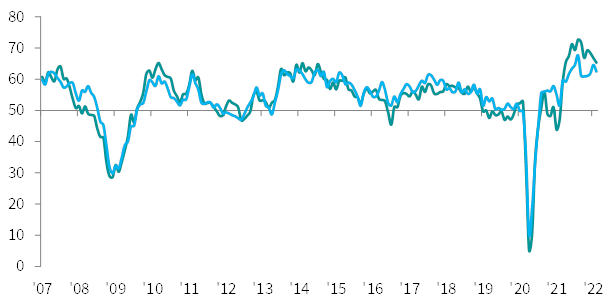Key findings
- Slower rises in permanent placements and temp billings
- Availability of staff falls at sharper rate, pay pressures intensify
- Vacancy growth accelerates
Data collected 10-22 February
Summary
UK recruitment consultancies registered a further marked increase in hiring activity during February, according to the latest KPMG and REC, UK Report on Jobs survey. That said, permanent staff appointments expanded at the softest rate for 11 months, while temp billings growth also slowed, as panel members stated that candidate shortages restricted their ability to fill roles. Notably, total candidate availability declined at a sharp and accelerated rate that was the quickest since last November. At the same time, vacancy growth picked up to a three-month high. A combination of robust demand for workers and low supply led to further upward pressure on rates of starting pay. Salaries for new permanent joiners rose at the second-fastest rate in over 24 years of data collection, while temp pay also increased sharply.
The report is compiled by IHS Markit from responses to questionnaires sent to a panel of around 400 UK recruitment and employment consultancies.
Softer, but still rapid increase in hiring activity
UK recruitment consultancies recorded a further robust increase in hiring activity during February amid reports of rising workloads at clients and greater confidence in the outlook. That said, permanent placement growth eased to an 11-month low and temp billings also expanded at a softer pace, with recruiters frequently stating that candidate shortages had limited their ability to fill roles.
Candidate supply falls at quickest rate for three months
The total availability of candidates fell at the sharpest rate since last November in February, driven by steeper falls in both permanent and temp staff supply. Lower candidate numbers were generally attributed to ongoing tight labour market conditions and robust demand for staff. There were also reports that the pool of candidates was limited due to lingering pandemic-related uncertainty and fewer foreign applicants.
Vacancy growth accelerates for first time since last July
Overall vacancies expanded at the quickest rate for three months in February. This marked the first acceleration of growth since last July, and was driven by sharper rises in demand for both permanent and temporary staff.
Pay pressures sharpen in February
Recruiters continued to see intense competition for workers in February, leading to further steep increases in rates of starting pay for both permanent and short-term staff. Notably, permanent starters' salaries rose at the second-sharpest pace since data collection began in October 1997.
Regional and Sector Variations
Data broken down by region showed that permanent staff appointments expanded at softer rates across all four English areas except the North of England, which also saw the sharpest overall increase.
The steepest increase in temp billings was recorded in London, followed closely by the North of England. That said, all four monitored English regions noted slower expansions that at the start of the year.
Historically marked increases in vacancies continued to be seen across both the public and private sectors during February. Growth of demand was strongest for permanent staff in the private sector. The slowest, but still steep, rise in vacancies was signalled for public sector permanent roles.
Sharp increases in permanent staff demand were seen across all ten monitored job categories midway through the first quarter. IT & Computing led the upturn, followed closely by Hotel & Catering. Secretarial/Clerical saw the softest increase.
Hotel & Catering topped the rankings in terms of temporary staff demand in February, followed by Blue Collar. Nonetheless, historically sharp rises in vacancies were also seen across the remaining eight categories monitored by the survey.
Comments
Commenting on the latest survey results, Neil Carberry, Chief Executive of the REC, said:
"Candidate availability has now been dropping for a year, which shows the scale of the labour shortage the UK faces. Recruiters are filling record numbers of posts, but demand is still rising. Those firms that are meeting their needs are working more collaboratively with their recruiters to get their offer to candidates right. Meanwhile, government can help by working with business to support people back into the labour market and address skills gaps. At a time when firms and workers are hard-pressed by inflation, making sure businesses can invest in wages and training matters. Ramping up National Insurance is not the right way to go."
Claire Warnes, Head of Education, Skills and Productivity at KPMG UK, said:
“While recruitment activity has slowed slightly, employers across all sectors continued to hire energetically during February, as their workloads increased and vacancy growth accelerated for the first time since last summer. But the lack of suitable candidates continued and fuelled yet further increases in starting salaries. The IT sector led the increase in demand for permanent staff, with hotel and catering close behind, possibly reflecting the reduction in pandemic measures across society. A sustained focus on skills shortages is required if all sectors of the economy are to leave winter behind and head into spring with confidence in the jobs market.”







